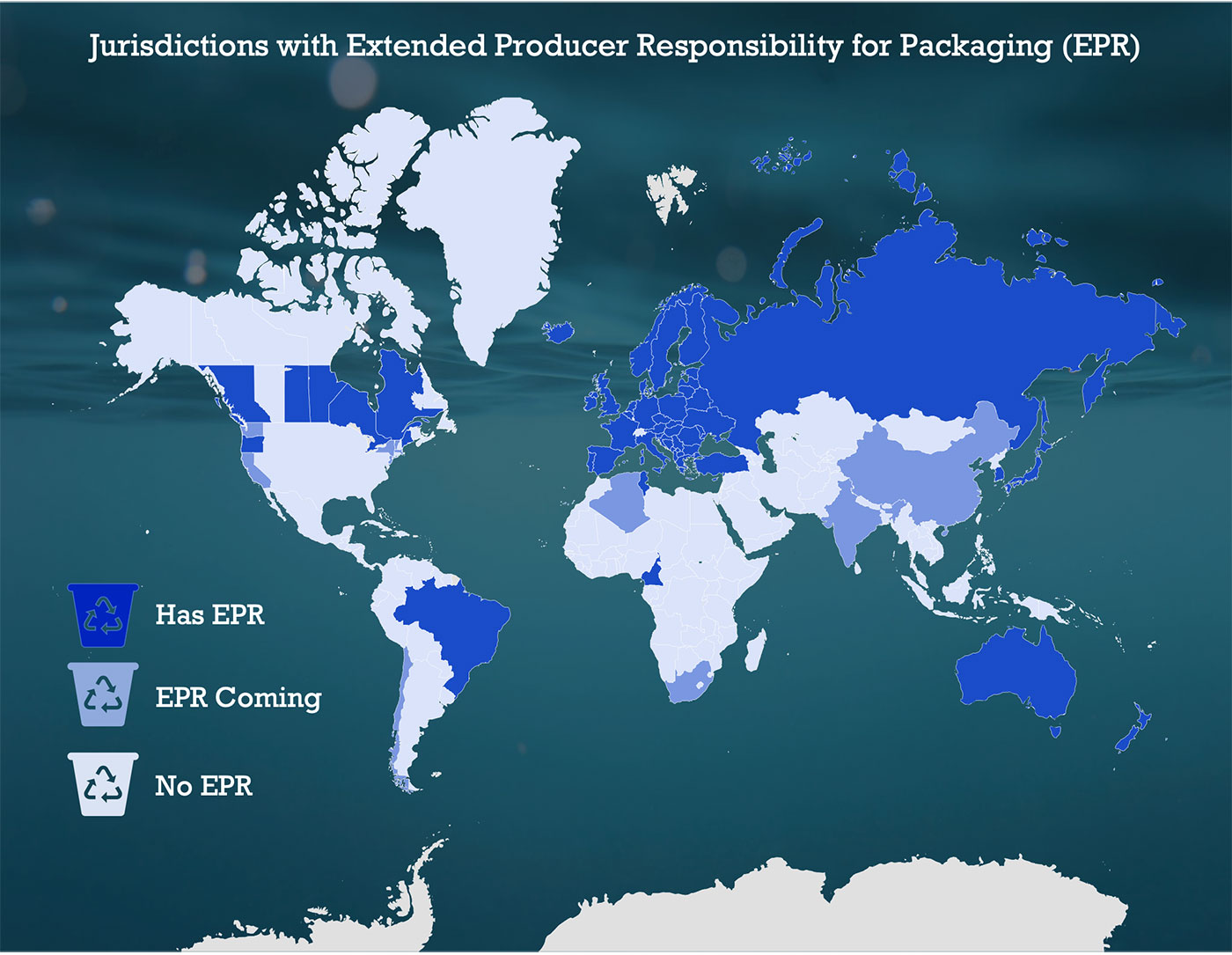Extended Producer Responsibility (EPR) for Packaging
Holding Corporations Accountable for Wasteful Packaging
On July 12, 2021, Maine became the first state in the nation to pass an Extended Producer Responsibility (EPR) for Packaging law requiring large corporations and manufacturers to help pay for the cost of recycling their wasteful packaging, much of it plastic. Maine has long championed product stewardship laws to safely and effectively dispose of difficult-to-dispose or dangerous products.
- How will the Extended Producer Responsibility for Packaging law work? How will it benefit Maine? Read our explainer blog or watch our video below for more information.
- Maine’s law has received widespread national attention, including from ABC News, as well as in the Washington Post, The New York Times, Governing, the Takeaway, and the PBS News Hour.
- Visit our online toolkit for tips and resources about bringing EPR for Packaging to your state.
Creating a More Equitable and Effective Recycling System
More than 40 jurisdictions around the world have successfully used Extended Producer Responsibility for Packaging to shift the costs of recycling from taxpayers to the producers of packaging such as Amazon, Walmart, Procter & Gamble, and other brand owners. Based on the data collected in these places, here are just some of the benefits Maine’s law will deliver to taxpayers and communities throughout the state:
- Cities and towns will receive much-needed resources to improve, maintain, and expand their recycling programs.
- The state recycling rate could more than double, helping to keep more trash out of landfills, incinerators, and our environment.
- The “polluter pays principle” will incentivize companies to reduce wasteful packaging and create greener products that can be easily recycled or reused.
The Natural Resources Council of Maine led a multi-year campaign for the EPR for Packaging law in partnership with thousands of Maine people and youth activists, local businesses, municipal waste managers, cities and towns, state legislators, and dozens of organizations that make up the Environmental Priorities Coalition. Maine Department of Environmental Protection (DEP) staff also played an important role in crafting the new law and are beginning the process of implementing this product stewardship program.
“The cost of recycling has skyrocketed, forcing Maine communities to abandon recycling efforts to stem huge price increases that fall on the property taxpayer. EPR for packaging is a step in the right direction by asking producers to be part of the solution.”
– Maine Municipal Association
How Will EPR for Packaging be Implemented in Maine?
Passing this law in Maine is a historic victory for our environment and for holding corporate polluters accountable, but the work is not over. We know that big corporations and plastic manufacturers will try to weaken the law as it’s implemented. Mainers will need to be tracking it every step of the way.
In 2022, the Maine Department of Environmental Protection (DEP) began conducting a public rulemaking to determine the details of the program as prescribed by the statute:
- How to calculate the annual fees for producers based on the type and amount of packaging they sell and adjusted for better packaging choices such as reusable packaging, recycled content, and truthful labeling;
- How reimbursement payments will be made to Maine’s municipalities in a way that encourages strong recycling programs with ease of access for Maine people,
- Determining the appropriate targets and performance standards, including collection rate targets and recycling rate targets, which will inform how to set the fees and reimbursements in a way that reaches those goals.
On December 6, 2024, the Maine Board of Environmental Protection voted to enact the new EPR for Packaging rules. The next step is for DEP to hire a stewardship organization through a competitive bidding process to administer the program. The producers will then make annual fees to the stewardship organization. Maine municipalities will get reimbursed for the costs of managing the producer’s packaging from that pool of funds.
According to Maine DEP, municipalities should receive the first payments by 2027 at the latest, but NRCM will work hard to push for a faster implementation timeline so we can bring long-overdue relief to Maine’s cities and towns sooner, and address the flood of wasteful packaging entering Maine.
How Can You Join the EPR for Packaging Movement?
There are still many things we can all do right now to protect and strengthen Maine’s EPR for Packaging law until the program is fully up and running.
Municipalities should continue to fund and maintain their recycling programs knowing that help is on the way. Read our fact sheet to learn what municipalities need to know about the new EPR law.
Concerned Mainers should still be vigilant in their waste reduction, reuse, and recycling policy efforts. There are many additional local and state policies and programs that complement EPR that should be pursued.
Producers and Businesses should continue to pursue efforts to reduce waste and use more sustainable packaging, knowing your efforts will be rewarded with reduced fee payments to the stewardship organization. If you are a local business, read our fact sheet to find out if you will be required to pay fees to the stewardship program, and how you can best prepare to reduce those fees.
EPR Advocates in Other States should keep the momentum going! Oregon passed a similar law to Maine's, and so have Colorado and California. NRCM has a lot of information to share with you. We have developed Advocacy Resources for EPR for Packaging to help other states pass similar product stewardship laws.











